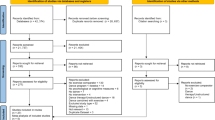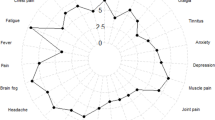Abstract
Purpose
The purpose of this study was to conduct a longitudinal examination of cognitive complaints and functional status in patients with chronic fatigue syndrome (CFS) alone and those who also had fibromyalgia (CFS/FM).
Methods
A total of 93 patients from a tertiary care fatigue clinic were evaluated on four occasions, each 6 months apart. Each evaluation included a tender point assessment, and self-reported functional status and cognitive complaints.
Results
Patients with CFS/FM reported significantly worse physical functioning, more bodily pain, and more cognitive difficulties (visuo-perceptual ability and verbal memory) than patients with CFS alone. Over time, bodily pain decreased only for participants with CFS alone. Verbal memory problems were associated with more bodily pain for both patient groups, whereas visuo-perceptual problems were associated with worse functional status for patients with CFS alone.
Conclusions
This study adds to the literature on functional status, longitudinal course, and cognitive difficulties among patients with CFS and those with CFS and FM. The results suggest that patients with CFS/FM are more disabled, have more cognitive complaints, and improve more slowly over time than patients with CFS alone. Specific cognitive difficulties are related to worse functional status, which supports the addition of cognitive difficulties to the FM case criteria.
Similar content being viewed by others
Notes
We used the average item value for each MASQ scale, consistent with the original MASQ article [21]. Other studies [26–28] have reported total scores across items for each scale. Average item values for each scale can be compared to total scores for each scale by multiplying the average item value by eight for all scales except visuo-perceptual ability, which is multiplied by 6.
References
Fukuda, K., Strauss, S. E., Hickie, I., Sharpe, M. C., Dobbins, J. G., Komaroff, A., et al. (1994). The chronic fatigue syndrome: A comprehensive approach to its definition and study. Annals of Internal Medicine, 121, 953–959.
Cockshell, S. J., & Mathias, J. L. (2013). Cognitive deficits in chronic fatigue syndrome and their relationship to psychological status, symptomatology, and everyday functioning. Neuropsychology, 27, 230–242.
Friedberg, F., Dechene, L., McKenzie, M. J, I. I., & Fontanetta, R. (2000). Symptom patterns in long-duration chronic fatigue syndrome. Journal of Psychosomatic Research, 48, 59–68.
Hickie, I., Lloyd, A., Hadzi-Pavlovic, D., Parker, G., Bird, K., & Wakefield, D. (1995). Can the chronic fatigue syndrome be defined by distinct clinical features? Psychological Medicine, 25, 925–935.
Aaron, L. A., Burke, M. M., & Buchwald, D. (2000). Overlapping conditions among patients with chronic fatigue syndrome, fibromyalgia, and temporomandibular disorder. Archives of Internal Medicine, 160, 221–227.
Brown, M. M., & Jason, L. A. (2007). Functioning in individuals with chronic fatigue syndrome: Increased impairment with co-occurring multiple chemical sensitivity and fibromyalgia. Dynamic Medicine, 6, 6.
Ciccone, D. S., & Natelson, B. H. (2003). Comorbid illness in women with chronic fatigue syndrome: A test of the single syndrome hypothesis. Psychosomatic Medicine, 65, 268–275.
Gotts, Z. M., Ellis, J. G., Deary, V., Barclay, N., & Newton, J. L. (2015). The association between daytime napping and cognitive functioning in chronic fatigue syndrome. PLoS ONE, 10, 1–12.
Schmaling, K., Lewis, D. H., Fiedelak, J. I., Mahurin, R., & Buchwald, D. S. (2003). Single-photon emission computerized tomography and neurocognitive function in patients with chronic fatigue syndrome. Psychosomatic Medicine, 65, 129–136.
Ickmans, K., Meeus, M., Kos, D., Clarys, P., Meersdom, G., Lambrecht, L., et al. (2013). Cognitive performance is of clinical importance, but is unrelated to pain severity in women with chronic fatigue syndrome. Clinical Rheumatology, 32, 1475–1485.
Wolfe, F., Clauw, D. J., Fitzcharles, M. A., Goldenberg, D. L., Katz, R. S., Mease, P., et al. (2010). The American College of Rheumatology preliminary diagnostic criteria for fibromyalgia and measurement of symptom severity. Arthritis Care & Research, 62, 600–610.
Wolfe, F., Smythe, H. A., Yunus, M. B., Bennett, R. M., Bombardier, C., Goldenberg, D. L., et al. (1990). The American College of Rheumatology 1990 criteria for the classification of fibromyalgia. Arthritis and Rheumatism, 33, 160–172.
Aaron, L. A., Herrell, R., Ashton, S., Belcourt, M., Schmaling, K., Goldberg, J., et al. (2001). Comorbid clinical conditions in chronic fatigue: A co-twin control study. Journal of General Internal Medicine, 16, 24–31.
Goldenberg, D. L., Simms, R. W., Geiger, A., & Komaroff, A. L. (1990). High frequency of fibromyalgia in patients with chronic fatigue seen in a primary care practice. Arthritis and Rheumatism, 33, 381–687.
Jason, L. A., Taylor, R. R., & Kennedy, C. L. (2000). Chronic fatigue syndrome, fibromyalgia, and multiple chemical sensitivities in a community-based sample of persons with chronic fatigue syndrome-like symptoms. Psychosomatic Medicine, 62, 655–663.
Yunus, M. B. (2013). Fibromyalgia: A central sensitivity syndrome. In M. B. Goldman, R. Troisi, & K. M. Rexrode (Eds.), Women and health (2nd ed., pp. 1331–1340). New York: Academic Press.
Tesio, V., Torta, D. M., Colonna, F., Leombruni, P., Ghiggia, A., Fusaro, E., et al. (2015). Are fibromyalgia patients cognitively impaired? Objective and subjective neuropsychological evidence. Arthritis Care & Research, 67, 143–150.
Leavitt, F., Katz, R. S., Mills, M., & Heard, A. R. (2002). Cognitive and dissociative manifestations in fibromyalgia. Journal of Clinical Rheumatology, 8, 77–84.
Ware, J. E, Jr, Snow, K. K., Kosinski, M., & Gandek, B. (1993). SF-36 Health survey: Manual and interpretation guide. Boston: The Health Institute, New England Medical Center.
Komaroff, A. L., Fagiolo, L., Doolittle, T. H., Gandek, B., Gleit, M. A., Guerriera, R. T., et al. (1996). Health status in patients with chronic fatigue syndrome and in general population and disease comparison groups. American Journal of Medicine, 101, 281–290.
Seidenberg, M., Haltiner, A., Taylor, M., Hermann, B., & Wyler, A. (1994). Development and validation of a multiple ability self-report questionnaire. Journal of Clinical and Experimental Neuropsychology, 16, 93–104.
Boomershine, C. S. (2012). A comprehensive evaluation of standardized assessment tools in the diagnosis of fibromyalgia and in the assessment of fibromyalgia severity. Pain Research and Treatment, 2012, 653714.
Williams, D. A., & Arnold, L. M. (2011). Measures of fibromyalgia. Arthritis Care & Research, 63, S86–S97.
Robins, L., & Helzer, J. (1985). Diagnostic interview schedule (DIS): Version III-A. St. Louis, MO: Department of Psychiatry, Washington University School of Medicine.
Schmaling, K. B., Fiedelak, J. I., Katon, W. J., Bader, J. O., & Buchwald, D. S. (2003). Prospective study of the prognosis of unexplained chronic fatigue in a clinic-based cohort. Psychosomatic Medicine, 65, 1047–1054.
Branco, J. C., Zachrisson, O., Perrot, S., & Mainguy, Y. (2010). A European multicentre double-blind placebo-controlled monotherapy clinical trial of milnacipran in treatment of fibromyalgia. Journal of Rheumatology, 37, 851–859.
Williams, D. A., Clauw, D. J., & Glass, J. M. (2011). Perceived cognitive dysfunction in fibromyalgia syndrome. Journal of Musculoskeletal Pain, 19(1), 66–75.
Kratz, A. L., Schilling, S., Goesling, J., & Williams, D. A. (2015). Development and initial validation of a brief self-report measure of cognitive dysfunction in fibromyalgia. Journal of Pain, 16(6), 527–536.
Raftery, A. E. (1996). Bayesian model selection in social research. In P. V. Marsden (Ed.), Sociological Methodology (Vol. 26, pp. 111–163). Oxford: Blackwell.
Wiborg, J. F., van der Werf, S., Prins, J. B., & Bleijenberg, G. (2010). Being homebound with chronic fatigue syndrome: A multidimensional comparison with outpatients. Psychiatry Research, 177(120), 246–249.
Cockshell, S. J., & Mathias, L. J. (2010). Cognitive functioning in chronic fatigue syndrome: A meta-analysis. Psychological Medicine, 40, 1253–1267.
Cockshell, S. J., & Mathias, L. J. (2014). Cognitive functioning in people with chronic fatigue syndrome: A comparison between subjective and objective measures. Neuropsychology, 28, 394–405.
Funding
This study was funded by the National Institute of Allergy and Infectious Disease (U19AI38429, Project 4 (Project PI, K. Schmaling).
Author information
Authors and Affiliations
Corresponding author
Ethics declarations
Conflict of interest
The authors declare that they have no conflict of interest.
Ethical approval
All procedures performed in studies involving human participants were in accordance with the ethical standards of the institutional and/or national research committee and with the 1964 Helsinki Declaration and its later amendments or comparable ethical standards.
Informed consent
Informed consent was obtained from all individual participants included in the study.
Rights and permissions
About this article
Cite this article
Schmaling, K.B., Betterton, K.L. Neurocognitive complaints and functional status among patients with chronic fatigue syndrome and fibromyalgia. Qual Life Res 25, 1257–1263 (2016). https://doi.org/10.1007/s11136-015-1160-y
Accepted:
Published:
Issue Date:
DOI: https://doi.org/10.1007/s11136-015-1160-y




